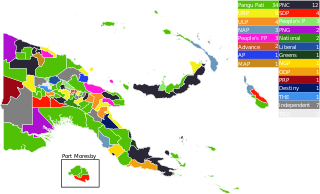
New Bougainville Party (NBP) is a political party in the Autonomous Region of Bougainville in Papua New Guinea.

The Vice President of the Autonomous Region of Bougainville is the second highest office in the province, which is an autonomous region of Papua New Guinea. The current Vice-President is Patrick Nisira, who was sworn in on 25 September 2020 after his appointment by President Ishmael Toroama.

Presidential elections were held in Bougainville from November 30 to December 18, 2008. Voters elected the new President of the Autonomous Region of Bougainville, following the death of President Joseph Kabui while in office, on June 7.

James Tanis is a politician in Papua New Guinea who was elected President of the Autonomous Region of Bougainville in 2008 following the death of Joseph Kabui while in office, serving the remainder of the term from 2009 to 2010. He was previously the Vice President of the Bougainville People's Congress.
Ezekiel Massat is a Bougainvillean lawyer and politician. Massat was appointed the Vice President of the Autonomous Region of Bougainville by President James Tanis on January 19, 2009. Bougainville is an autonomous region within Papua New Guinea.

General elections were held in the Autonomous Region of Bougainville in Papua New Guinea from 6 to 24 May 2010.

John Momis is a Bougainvillean politician who served as the President of the Autonomous Region of Bougainville in Papua New Guinea between 2010 and 2020.
Patrick Nisira is a Bougainvillean politician. He was Vice President of the Autonomous Region of Bougainville under President John Momis from 10 June 2010 to 22 February 2017. He was reappointed as vice president by Ishmael Toroama on 25 September 2020.
Timothy Masiu is a Papua New Guinean politician. He has been a member of the National Parliament of Papua New Guinea since July 2016, representing the electorate of South Bougainville Open for the People's Progress Party (2016–2017) and National Alliance Party (2017–present).
Joe Lera was a Papua New Guinean politician from 2012 to 2020. He was a United Resources Party member of the National Parliament of Papua New Guinea, representing the Bougainville Regional seat. Although regional members generally assume the position of Governor, due to the existence of the devolved Autonomous Bougainville Government Lera was referred to as the "Regional Member for Bougainville". He was Minister for Bougainville Affairs in the government of Peter O'Neill.

A non-binding independence referendum was held in Bougainville, an autonomous region of Papua New Guinea, between 23 November and 7 December 2019. The referendum question presented a choice between greater autonomy within Papua New Guinea and full independence; voters voted overwhelmingly (98.31%) for independence.

Rose Pihei is a politician in the Autonomous Region of Bougainville in Papua New Guinea. She was a member of the Bougainville House of Representatives from 2010 to 2015, representing the South Bougainville (Women's) constituency.
Raymond Masono was a politician from Autonomous Region of Bougainville. He was the Vice-President of the Autonomous Region of Bougainville from 2017 to 2020.
Joseph Kangaki Nabuai is a Papua New Guinean politician from the Autonomous Region of Bougainville. He is a member of the Bougainville House of Representatives.
A presidential and parliamentary election was held in the Autonomous Region of Bougainville between 12 August and 1 September 2020. 440 candidates were contesting the 40 seats in the Bougainville House of Representatives, including 25 competing to be President of the Autonomous Region of Bougainville. The new government will negotiate the outcome of the 2019 Bougainvillean independence referendum, which saw 98.3% of voters supporting independence from Papua New Guinea.

Ishmael Toroama is a Bougainvillean politician who was elected President of the Autonomous Region of Bougainville in 2020. He is a former commander in the Bougainville Revolutionary Army.
Amanda Masono Getsi is a member of the House of Representatives in the Autonomous Region of Bougainville in Papua New Guinea (PNG).

General elections were held in Papua New Guinea from 4 to 22 July 2022 to elect the members of the National Parliament for a new five-year term.

The Bougainville Executive Council forms a part of the executive arm of the Autonomous Bougainville Government together with the President of the Autonomous Region of Bougainville.

The inaugural presidential and parliamentary elections were held in the Autonomous Region of Bougainville in Papua New Guinea from 20 May to 9 June 2005. Considered fair, peaceful and successful, the elections resulted in Joseph Kabui becoming the first President of the Autonomous Region of Bougainville.









